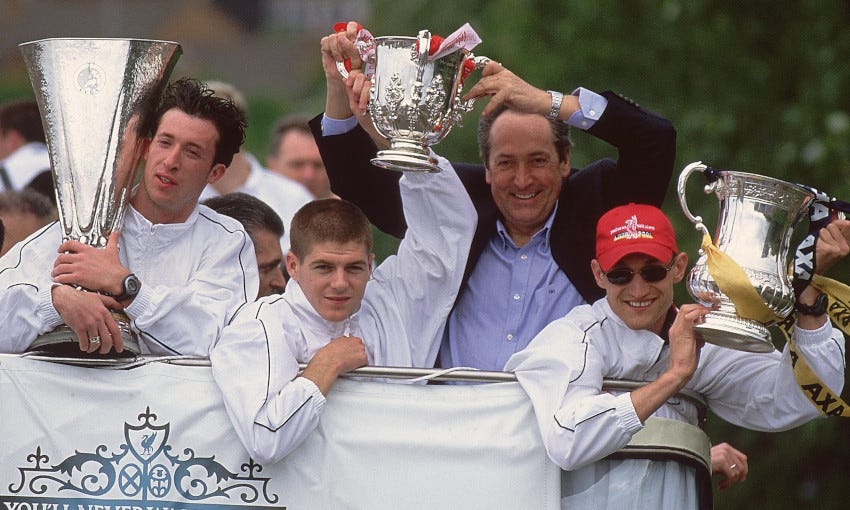We didn’t see this one coming.
In the desert that was the most of the 90s, it seemed impossible that, as the new decade blossomed, three trophies would be secured in the space of three months. But that’s what Houllier’s 2000-01 vintage achieved: a unique treble together with a third place finish and the arguably more important reward of entry into the rebranded Champions League.
And I can't recall a better week as a Liverpool fan than the final week of that season: Cardiff to see Michael Owen rob the FA Cup off Arsenal; Dortmund in mkidweek for the Golden Goal UEFA Cup final against Alaves; then down to Charlton on Sunday to see the Reds qualify for the Champions League for the first time.
If I kept a diary, it would have recorded:
Left home Friday lunchtime, train to Cardiff for FA Cup final, stayed in Cardiff Friday and Saturday nights, back home on Sunday, day at work on Monday, pack, flew to Dusseldorf on Tuesday, train to Dortmund for UEFA Cup final, stayed Tuesday and Wednesday nights, train and flight back home on Thursday, work on Friday, travelled to London on Sunday for Charlton. The best (and most expensive!) week I’ve ever had following Liverpool since I began in 1968!
There’s a paradox here; a contradiction that goes right to the heart of Gerard Houllier’s management and legacy of the Liverpool team. An achievement that will probably never be repeated and yet within a few years the memory had been somewhat soured by a combination of heightened expectations, a damaged aorta and a disastrous 2002 recruitment policy. Moreover, the surreal events of Istanbul and Rafa’s impact probably overshadowed the treble season to a degree. The events of that momentous spring and early summer, the drama, the goals, the heroics, the return to the top table that we see as our place; it could be argued that rather than peer back at them through a rose coloured prism, we have all done the opposite and not given the team, or Houllier, the credit that is deserved. Though it's undeniable that this treble cup-winning season did not prove to be the springboard that we hoped it would be.
But this season was a redemptive one, a campaign in which the whole of Europe was forced to sit up and, once again, recognise the continental rehabilitation of the Reds. Though Roy Evans had given Liverpool fans some great moments with his 5-3-2 that got the most out of the formidable talents of Robbie Fowler and Steve McManaman, though the passing had been a joy and the swashbuckling verve had left us breathless at times, they had, ultimately, flattered to deceive, a 1995 League Cup being the only success in that era. Moreover, European nights had become something of a trial; a club with proud traditions of four times European champions and back-to-back European Cup winners had regressed alarmingly in this arena since the Heysel disaster. Kopites became used to watching forlornly as PSG (emphatically not the PSG of today) hammered three goals past a shoddy defence and the dubious might of Celta Vigo vanquished the Reds.
As the nineties drew to a close, Liverpool Football Club – the doyens of European pedigree – found themselves cast adrift from the elite. This season changed all that; in many ways it laid the foundations for Istanbul. The irony, of course, is that that miraculous night outshone that which made it possible.
The rest of this article is for Dynasty subscribers only.
Keep reading with a 7-day free trial
Subscribe to Dynasty – The Tomkins Times to keep reading this post and get 7 days of free access to the full post archives.




